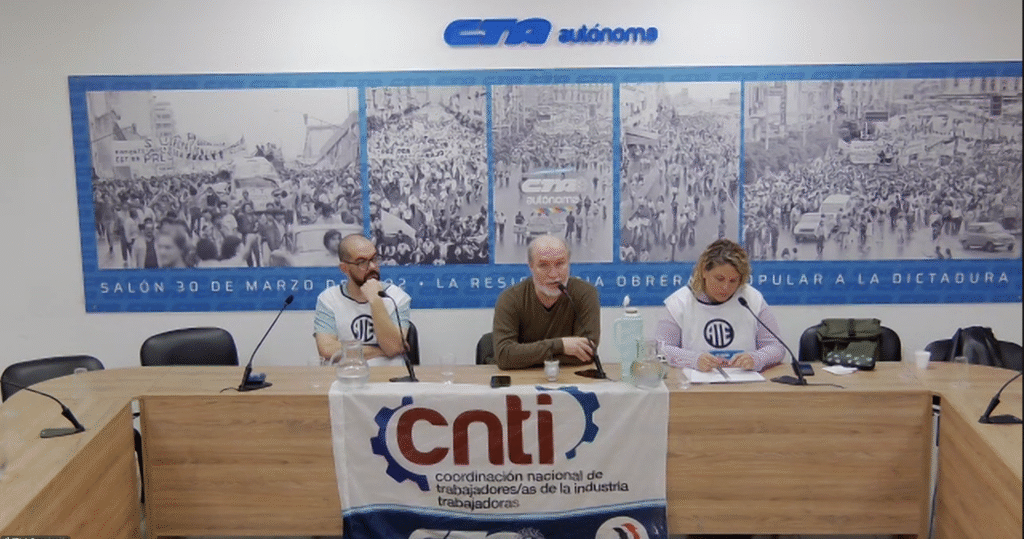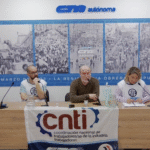28 October, 2025In an online meeting, organized by IndustriALL Global Union, trade union representatives from Spain and France met with their counterparts in Argentina to express solidarity amid concerns over proposals to privatize and fragment Argentina’s public nuclear sector. The discussion was not about technical issues or internal disputes, but about the future of a sector vital to public safety, highly skilled jobs and national technology, built over decades by thousands of workers whose expertise cannot be replaced overnight.
Argentine unions outlined the risks of privatization, including private involvement in the NA-SA operator, pressure on the Heavy Water Industrial Plant (PIAP) and the paralysis of strategic projects such as CAREM (a nationally designed SMR with very advanced civil works) and RA-10 (research and radioisotopes). They warned that breaking up the public system would destroy synergies and cause an irreversible loss of skills built up over decades.
Participants also raised alarm over low wages, with many workers earning below the poverty line, with categories not exceeding the equivalent of USD 400. The result is immediate: a brain drain of people aged between 20 and 40, recruited by foreign companies, and the hasty departure of professionals with training that took years to consolidate. This is not only unfair, but also undermines the culture of safety and the transmission of knowledge between generations now leaving for better-paid jobs abroad.
“We’re not talking about theory, we’re talking about salaries that don’t cover basic needs and technicians leaving,” said Rodolfo Kempf of CTA-CNTI Argentina. “If we lose these people, we lose safety and the future.”
Safety and waste management were shared concerns. Delegates stressed that privatizing these areas or blurring responsibility would be unacceptable.
Yann Perrotte, FO FédéChimie France, said: “Safety requires a clear public framework. In waste and fuel cycle management, the rules must be clear and public.”
The meeting also highlighted the importance of protecting Argentina’s independent nuclear regulatory authority, whose technical capacity and autonomy are vital to safety.
What Spain and France have to say
Spain shared its experience with the planned closure of nuclear power plants between 2027 and 2035, highlighting the role of the public waste management company in preparing for decommissioning and the importance of drawing on the knowledge of staff who have operated the plants. Trade unions emphasize the need for clauses to protect jobs and skills during both operation and closure, and stress that major energy decisions cannot succeed without a stable national agreement and genuine social dialogue.
From France, participants reflected on the consequences of 25 years of market liberalization, underinvestment, loss of skills and job insecurity, before the State bought back 100 per cent of EDF to restore long-term investment capacity. The lesson, they said, is clear: the nuclear sector cannot operate on short-term, market-driven logic. It needs strong institutions, patient financing and stable policies.
Carlos Pérez from Spain’s UGT FICA said: “Nothing works without social dialogue and skills planning. In operation and decommissioning, decent employment and knowledge are the lifeblood of safety.”
Why this matters to all of us
Trade unions defend safety, decent work and industrial capacity. As electricity demand continues to rise, driven by data centres and rapid digitalization, every country will need effective public planning, independent regulation and skilled workers with secure rights.
IndustriALL director of the energy sector, Diana Junquera, said:
“Trade union solidarity is not a gesture: it is our safety strategy. If a country dismantles its nuclear ecosystem, it loses capabilities that take decades to regain. There are no easy solutions. But there is a clear path: decent work, transparency and solidarity with the international movement . In this, IndustriALL and its affiliates stand and will continue to stand with Argentina.”




